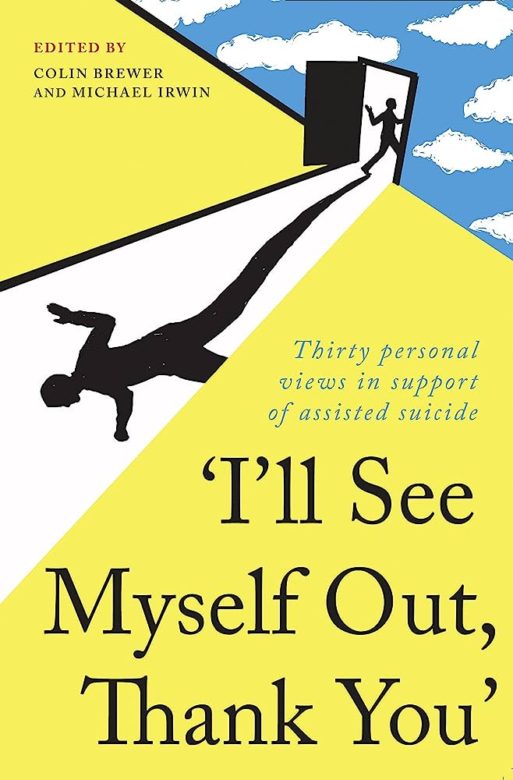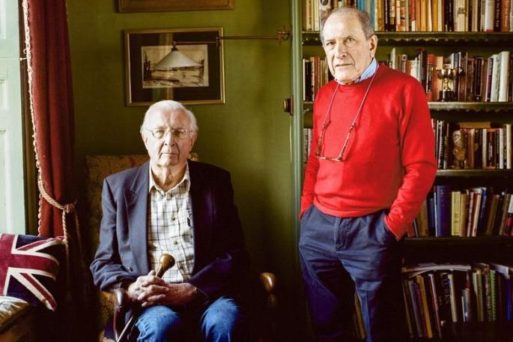 When I first started reading “I’ll See Myself Out, Thank You” I thought to myself, “I’m really going to enjoy this book.” A collection of short essays in support of medically assisted rational suicide (the editors’ term to describe physician-assisted death), the book begins with an introduction by co-editor Colin Brewer, in which he walks the reader through his and others’ thus far, thwarted efforts to have aid in dying legalized in the United Kingdom. Brewer is a retired psychiatrist and the co-director of My Death My Decision, an organization that lobbies for a “more compassionate approach to dying” in the U.K.
When I first started reading “I’ll See Myself Out, Thank You” I thought to myself, “I’m really going to enjoy this book.” A collection of short essays in support of medically assisted rational suicide (the editors’ term to describe physician-assisted death), the book begins with an introduction by co-editor Colin Brewer, in which he walks the reader through his and others’ thus far, thwarted efforts to have aid in dying legalized in the United Kingdom. Brewer is a retired psychiatrist and the co-director of My Death My Decision, an organization that lobbies for a “more compassionate approach to dying” in the U.K.
After the introduction, the first few essays are touching and quite personal. One is a letter written by journalist Melanie Reid to The Times in 2012. Severely disabled and in constant pain after a fall from a horse many years ago, Ms. Reid writes about her almost daily wish to end her life. She provides a short but reasoned argument in favor of extending medical aid in dying to people like herself, who do not meet the strict definition of being terminally ill.
There is also a heartbreaking essay by the late Chris Woodhead, in which he describes his daily struggles with motor neuron disease (the British term for ALS). He writes about his physical challenges as well as the emotional conflict between the desire to end his suffering and the desire to see another sunset or spend another day with his wife. It’s a very touching essay, and one that speaks particularly well to the issue that, for me, is central to the ongoing debate — that almost no one who seeks out medical aid in dying actually wants to die. They simply don’t want to continue living in the way that fate has dictated they must.
And there are other, excellent essays in “I’ll See Myself Out, Thank You.” Silvan Luley, Ludwig A. Minelli and Sandra Martino share a number of stories about their experiences helping Britons access medical aid in dying through the Swiss organization Dignitas (a process so costly it is available only to the financially well off). Michael Irwin, an octogenarian, writes compellingly about the need for legal, “rational old-age suicide.” And Rev. Paul Badham writes eloquently about the fallacious nature of the arguments set forth by many Christian leaders (who are heavily represented in the British Parliament) who have lobbied against the right of Britons to determine how and when they will die.
In fact, each of the 30 essays in the book are well-written and engaging in their own right. But after reading about half of them, I found myself wondering if I really cared to read the rest. The arguments the authors put forth in favor of medical aid in dying are persuasive and compelling. But after reading 15 essays about the right to personal autonomy and a graceful exit from this life, I, quite frankly, began to get bored. Perhaps I would feel differently if I were less informed about the issue or on the fence about whether medical aid in dying should be legal or not. But I am neither. So the essays, while cogent and well-written, were a bit like “preaching to the choir” for me.

Michael Irwin (left) and Colin Brewer
Credit: Jooney Woodward/The Times
With that said, I do believe that there is value in this book, especially for those who are unsure about the ethics of medical aid in dying, or who simply want to learn more about the arguments both pro and con. For me, it’s not a complex issue. The right to make decisions about how we live is one of the most basic of all human rights, and that right extends to the manner and timing of our deaths. But I know that for many people, especially those with strong religious convictions, it’s more complicated than that. And for them, this collection of carefully crafted essays may provide a path to understanding why laws that allow people to die with dignity (or at least don’t punish those who help them do so) are necessary in any civilized society.
Note: At this time in the United Kingdom, assisting a person in ending their lives is a crime punishable by up to 14 years in prison.

 “I’ll See Myself Out, Thank You” Edited by Colin Brewer and Michael Irwin
“I’ll See Myself Out, Thank You” Edited by Colin Brewer and Michael Irwin


 Recovering Cremation Remains After the Los Angeles Fires
Recovering Cremation Remains After the Los Angeles Fires
 “As Tears Go By” by Marianne Faithfull
“As Tears Go By” by Marianne Faithfull















